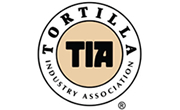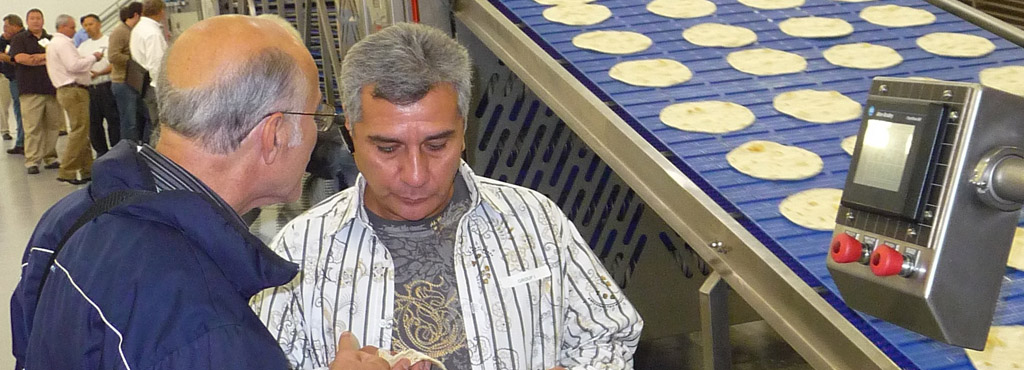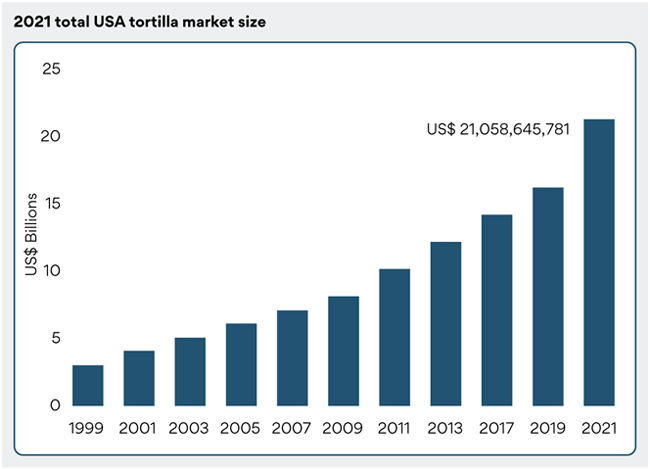 Tortilla Industry Association (TIA). TORTILLA - Flat breads in an expanding market.
Tortilla Industry Association (TIA). TORTILLA - Flat breads in an expanding market.
Written by: Jim Kabbani, CEO, The Tortilla Industry Association (TIA) (pictured)
 The earliest evidence of people using fire to cook food is from the Neanderthal/Homo Sapiens intersection about 75,000 years ago. Flour milled from different grains and mixed with water, then baked on a fire-heated rock were the first flatbreads and have remained a staple for much of humanity over the past 5,000 years. In fact, the most ancient original bread known to humans is flat bread.
The earliest evidence of people using fire to cook food is from the Neanderthal/Homo Sapiens intersection about 75,000 years ago. Flour milled from different grains and mixed with water, then baked on a fire-heated rock were the first flatbreads and have remained a staple for much of humanity over the past 5,000 years. In fact, the most ancient original bread known to humans is flat bread.
In the Middle East this evolved into Pita and Lavash, in India, naan or chapatti; in China they call it po bin; the North American First Nations made johnnycake; the Norwegians, flattbrod; in Ethiopia, injera; among the ancient Israelites, it was matzoh.
But in Meso-America, (Now Mexico), the principal grain used corn was cooked with water and lime to produce ‘Nixtamal’ which was shaped doughballs, flattened and baked on a hot metal griddle called a Comal.
The Aztecs and other speakers of the Nahuatl language in the region called this flatbread Tlaxcall, and its use has been documented at least as far back as 500 BC.
When Spanish explorers arrived, the yellow flat disc-shaped food reminded them of their own similarly shaped and coloured "Tortilla" so they gave it the same name despite their own version being essentially an egg omelette containing potatoes and onions. As the language and culture of the Spanish conquerors ended up prevailing over these lands, so did the name Tortilla for this flatbread.
Today, the largest proportion of all bread products produced worldwide consists of the wide variety of flatbreads, with Tortillas being the fastest growing sector. The traditional corn tortilla was soon joined by a wheat flour version whose popularity skyrocketed over recent years to the point where in the USA, there is now a 50/50 market split between the two. Elsewhere in the world, this split varies by country – most European sales of tortillas are heavily weighted towards the flour version, whilst Italy bucks the trend preferring corn. The cradle and birthplace of tortillas, Mexico, currently enjoys a stable and saturated market with a near even split between corn and flour types. Manufacture is divided among the multitude of smaller producers as opposed to the few industrial plant factories.

The TIA now covers all flatbreads including: Pita, Naan, Lavash etc. Through our new collaboration with IFF (International Flat Bread Federation)
The Tortilla Industry Association (TIA) tracks all products that start life as tortillas, such as tortilla chips and tacos made from tortilla dough which are then fried or baked to crispiness. Whilst there is a plethora of flavours available, cooking remains remarkably similar across the board. Today’s increasingly complex dietary preferences and regulatory demands have resulted in a vast diversification of flatbread types, baking methods, ingredients and formulation, creating new but difficult challenges for flatbread producers.
This has given rise to the need for manufacturers to join forces, exchange information, share best practice, learn the latest in formulation advances and regulatory requirements.
This concept of support has given birth to the Tortilla Industry Association, or TIA. Founded in the United States in 1989 as a non-profit organisation, The TIA began by holding Annual Conventions each of includes exhibition hall, education sessions and networking social events.
The show's success and thirst for knowledge amongst manufacturers compelled TIA to launch a second event each year, the TIA Technical Conference which focuses on educational sessions and factory tours where attendees can see first-hand how other companies in the industry operate.
With Tortillas now being recognised as a healthy foodstuff, the US market enjoys sales of US$17 Billion+ p.a. The rapid growth (Figure 1) of tortilla sales is also evident across the rest of world including Europe in particular, through to Australasia, the Middle East and many more countries, as they are low-carb, organic, non-GMO, clean-label and similar attributes. Kosher and Gluten-free alternatives are also making their mark.

Figure 1
Finally, increased government regulation and added complexity to the production process, including better labelling, is encouraging the industry to join together to share the latest knowledge and best practice, to foster greater innovation in this 3,000 year old product!
TIA Europe Conference at iba Munich 2023
In response to demand by its European member companies, TIA's European conference is growing in popularity and will run from the 24th–25th October 2023 in Munich, Germany co-located inside the IBA convention at the Messe, with a free IBA ticket included in your TIA registration.
Educational sessions for this event have been selected based on a survey of TIA's list of over 6,000 tortilla professionals world-wide and seeing which issues concern them the most. The survey results are tallied and ranked, then TIA identifies leading experts for each topic and invites them to give a presentation at the conference "Share the profits and the passion".
So why not spend two days at the European TIA conference – you may find it quite an eye-opener!
REGISTER TODAY